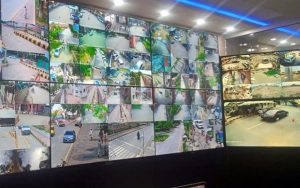The Khyber-Pakhtunkhwa police force has introduced the first of its type in Pakistan: a security control system powered by artificial intelligence (AI) in the city of Peshawar.

The technology, which was developed by the Central Police Office, has already begun data and facial detection analysis of the roughly 57,000 people that enter the city’s red zone each day.
All visitors to the “red zone,” which includes the Central Jail, Police Lines, Corps Commander’s House, Central Police Office, Civil Secretariat, Governor’s House, and Chief Minister’s House, would be tracked and analysed by the AI security system.
Most notably, the system now includes information about female militants, terrorists, and criminals for the first time. An alarm will go off and the nearest police checkpoint will be notified if a person matching this description enters the red zone.
Additionally, the AI intelligence system will record any birds that enter the red zone, adding another layer of protection. This state-of-the-art technology will be used to increase patrols and monitoring of the red zone, protecting sensitive areas.
K-P IG of Police Akhtar Hayat Khan emphasised the importance of this technical development in enhancing security measures while speaking to The Express Tribune.
He stressed that the collaboration of different security services was crucial to the success of this initiative, the first of its kind in Pakistan.
In order to better manage traffic and increase security, many cities throughout the world have installed comparable technology-based solutions.
Peshawar is the pilot city for a new security system that uses artificial intelligence technology; in subsequent phases, the system will be rolled out to Balahisar Fort and the rest of the Cantonment region.
According to IG Akhtar, the retrieval of CCTV footage has always been a bottleneck in investigations because to delays and obstructions, but the new AI technology will completely change the game. He said that the new AI system will allow for the rapid access to information and subsequent apprehension of criminals.
He also said that the security apparatus would undergo a radical overhaul if the technology was implemented in the red zone and important structures.
Syed Ashfaq Anwar, CCPO of the K-P police, has attended multiple international security conferences alongside police from the United States and the United Kingdom, and he has spoken at length about the efficacy of AI-driven surveillance systems.
In an interview with The Express Tribune, he made an analogy to the United States, where CCTV cameras have replaced the need for constant street lighting.
With this kind of monitoring, it would be difficult to avoid legal consequences. He outlined how laptops in patrol cars allow police to easily access data including vehicle registrations, personnel information, workplace details, and even bank accounts.
Anwar stressed the importance of creating “Smart Cities” and using AI-based security solutions in order to lower crime rates. He used London as an example of a place where widespread surveillance cameras have rendered criminals’ ability to avoid capture nearly impossible. Technology has allowed police to respond quickly to crimes and make arrests in the hours following an incident.
Around 350 CCTV cameras with artificial intelligence security systems have been deployed in strategic locations in Peshawar. The NADRA database is cross-referenced by the AI system to detect people hiding their identities behind masks and helmets.
In addition, anybody who show up to the security checkpoint carrying protective headgear or masks will be sent away.
IT Director of KP Police Naveed Khan told The Express Tribune that advanced surveillance capabilities are built into the AI system. Invisible “red lines” have been marked on the walls of police lines, jails, and other high-security structures.
Anyone stepping over these boundaries, attempting to gain access to restricted areas through unapproved means (such as climbing walls or rooftops), or engaging in other suspicious behaviour will trigger an alarm that will send Quick Response Teams to the scene quickly.









































